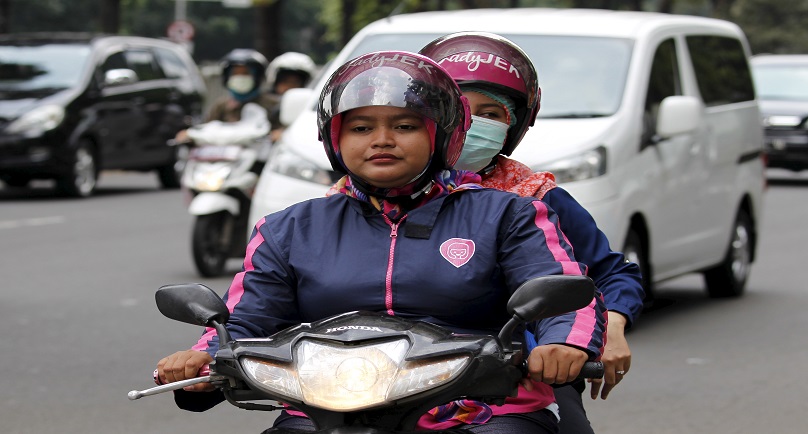Image: A Ladyjek driver (L) carries a customer as they ride a motorcycle at a street in Jakarta, January 11, 2016. Picture taken January 11, 2016. REUTERS/Garry Lotulung
By Fransiska Nangoy
JAKARTA (Reuters) – Jakarta is seeing a growing number of transportation services catering exclusively to women, offering better security and comfort when compared to packed public buses and trains in the Indonesian capital of 10 million people.
Ladyjek and Sister Ojek, the most recent entrants to the female-only taxi services, have seen business take off less than four months after starting operations in the predominately Muslim nation.
“In other public transportation such as public minivans, there are too many men in such a tight space, which makes me feel very uncomfortable. However, I feel safe if it’s Ladyjek because the bikers are also women,” Uki Pratiwi told Reuters before hopping on a motorcycle driven by a Ladyjek employee.
Since its launch in October, the Ladyjek mobile app has been downloaded about 50,000 times and hundreds of Indonesia’s use its services each day, said Ladyjek founder Brian Mulyadi.
The company employs about 2,400 drivers, mostly housewives or students, and hopes to soon expand outside the capital.
Dozens of motorcycle-sharing companies have set up in Indonesia in the past year or so, seeking to emulate the success of Go-Jek, the first firm in Jakarta to use smartphones to tap into the country’s millions of traditional motorcycle taxis, known as ojeks.
“The other online motorbike taxi services are very convenient but there’s no service to take care of the safety and comfort of women. That’s why I created Ladyjek,” Mulyadi said.
Other companies similar to Ladyjek include Ojesy or Ojek Syari, which offers hijab-wearing drivers.
The rape of a woman in a public minivan sparked uproar in Jakarta last June, but critics say the government has done little to prevent future cases.
“The government hasn’t really done much. Even when there are passengers who felt they were harassed and reported it to authorities, the police are often confused about how to tackle the problem,” transportation analyst Azas Tigor Nainggolan said.
(Additional reporting by Quincy de Neve; Editing by Randy Fabi and Stephen Coates)
Copyright 2015 Thomson Reuters. Click for Restrictions.


